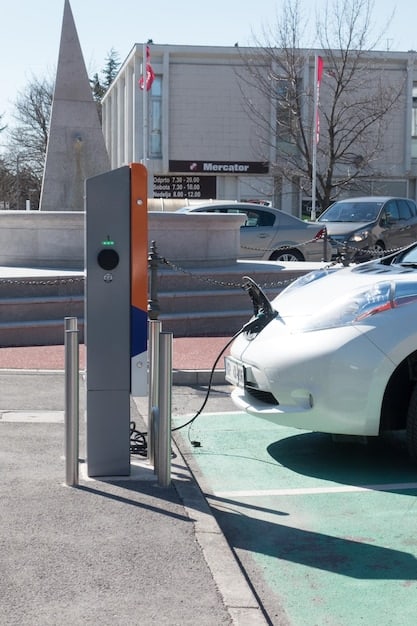Eco-Friendly Travel: Sustainable Tips for the US in 2025

Eco-friendly travel in the US in 2025 involves adopting sustainable practices like choosing fuel-efficient transportation, supporting local businesses, reducing waste, and opting for eco-friendly accommodations to minimize your carbon footprint while exploring the country.
Planning a trip in the US for 2025? Make it count by embracing eco-friendly travel: sustainable tips for reducing your carbon footprint in the US in 2025, ensuring your adventures contribute to a healthier planet.
Why Choose Eco-Friendly Travel?
Eco-friendly travel isn’t just a trend; it’s a necessary shift in how we explore the world. By making conscious choices, we can significantly reduce our impact on the environment and support local communities.
Embarking on sustainable adventures allows us to preserve the natural beauty of the US for future generations, ensuring our travels leave a positive legacy.
Protecting Natural Resources
Sustainable travel helps conserve precious resources like water, energy, and biodiversity. By reducing waste and pollution, we can maintain the health of ecosystems and protect endangered species.
Opting for eco-friendly accommodations and activities supports businesses committed to minimizing their environmental impact and promoting responsible tourism.
Supporting Local Communities
Eco-friendly travel encourages economic growth in local communities by supporting small businesses and preserving cultural heritage. This strengthens the social fabric and ensures that tourism benefits everyone.
By choosing locally sourced products and experiences, you directly contribute to the livelihoods of residents and help sustain traditional practices and crafts.
- Choose accommodations with green certifications.
- Support local farmers’ markets and restaurants.
- Participate in community-based tourism initiatives.
In conclusion, choosing eco-friendly travel not only protects the environment but also supports local economies and ensures a more authentic and enriching travel experience for all.
Sustainable Transportation Options
Transportation is a major contributor to carbon emissions, so choosing sustainable modes of travel is crucial. Explore the US with a lower carbon footprint by considering these alternatives.
Selecting eco-friendly transportation methods reduces air pollution, minimizes congestion, and promotes a healthier environment for both travelers and local communities.

Electric Vehicles
Renting an electric vehicle (EV) is a great way to reduce your carbon footprint. EVs produce zero emissions and offer a smooth, quiet ride, perfect for exploring urban areas and scenic routes.
With the increasing availability of charging stations across the US, EVs are becoming more practical for long-distance travel, making them a viable option for eco-conscious travelers.
Public Transportation
Utilizing public transportation like buses, trains, and subways is an excellent way to reduce traffic congestion and carbon emissions. Many US cities offer efficient and affordable public transit systems.
By opting for public transport, you not only reduce your environmental impact but also experience the city like a local, gaining a deeper connection to the culture and community.
Cycling and Walking
Explore cities and natural landscapes by bike or on foot to minimize your carbon footprint and enjoy a more immersive experience. Many US destinations offer dedicated bike lanes and walking trails.
Cycling and walking are not only sustainable but also promote physical health and allow you to discover hidden gems that you might miss when traveling by car.
- Rent an electric scooter for short distances.
- Join a guided walking tour to learn about local history.
- Use ride-sharing services that offer hybrid or electric vehicles.
Therefore, opting for sustainable transportation methods like EVs, public transit, cycling, and walking greatly reduces your environmental impact and enhances your travel experience.
Eco-Friendly Accommodation Choices
Where you stay can significantly impact your carbon footprint. Choosing eco-friendly accommodations ensures you’re supporting businesses committed to sustainability.
Eco-friendly accommodations often implement practices that reduce energy and water consumption, minimize waste, and support local communities.
Green Hotels
Green hotels are committed to reducing their environmental impact through various initiatives, such as energy-efficient lighting, water conservation programs, and waste reduction strategies.
These hotels often have certifications like LEED or Green Globe, ensuring they meet strict environmental standards and are dedicated to sustainable practices.

Eco-Lodges and Resorts
Eco-lodges and resorts focus on preserving the natural environment and supporting local communities. They often use sustainable building materials, renewable energy sources, and offer eco-tours and activities.
Staying at an eco-lodge or resort provides an opportunity to immerse yourself in nature while contributing to the conservation of local ecosystems and the well-being of residents.
Sustainable Vacation Rentals
Opt for vacation rentals that prioritize sustainability, such as homes with solar panels, energy-efficient appliances, and water-saving fixtures. Look for rentals that support local initiatives and promote responsible tourism.
Choosing a sustainable vacation rental allows you to enjoy the comforts of home while minimizing your environmental impact and contributing to the sustainability of the destination.
- Look for accommodations with recycling programs.
- Choose accommodations that use eco-friendly cleaning products.
- Support accommodations that employ local staff and source local products.
In summary, selecting eco-friendly accommodations, such as green hotels, eco-lodges, and sustainable vacation rentals, demonstrates your commitment to sustainability and supports businesses that prioritize environmental responsibility.
Reducing Waste on Your Trip
Minimizing waste is a key aspect of eco-friendly travel. Simple changes in your habits can significantly reduce your environmental impact while on the road.
Reducing waste not only conserves resources but also minimizes pollution and protects the natural beauty of the US.
Pack Reusable Items
Bring your own reusable water bottle, coffee cup, shopping bags, and cutlery to avoid single-use plastics. These items are lightweight and easy to pack, yet they can make a big difference.
Investing in reusable items reduces waste and saves money in the long run, making your travels more sustainable and budget-friendly.
Refuse Single-Use Plastics
Say no to plastic straws, bags, and utensils whenever possible. Support businesses that offer alternatives and prioritize reusable or compostable options.
By refusing single-use plastics, you’re sending a message to businesses that you value sustainability and encouraging them to adopt more eco-friendly practices.
Proper Waste Disposal
Be mindful of proper waste disposal practices. Recycle whenever possible and compost food scraps if facilities are available. Avoid littering and dispose of waste responsibly.
Following proper waste disposal guidelines helps keep the environment clean and prevents pollution, ensuring a healthier ecosystem for both humans and wildlife.
- Carry a trash bag for collecting waste during outdoor activities.
- Support zero-waste initiatives and businesses.
- Choose products with minimal packaging.
In conclusion, reducing waste by packing reusable items, refusing single-use plastics, and practicing proper waste disposal is essential for minimizing your environmental impact and promoting sustainable travel.
Supporting Local and Sustainable Businesses
One of the best ways to be an eco-friendly traveler is to support businesses that prioritize sustainability and contribute positively to the local economy.
Supporting local and sustainable businesses promotes economic growth, preserves cultural heritage, and encourages responsible tourism.
Farm-to-Table Restaurants
Dine at restaurants that source their ingredients from local farms and producers. These establishments often use sustainable farming practices and reduce their carbon footprint by minimizing transportation.
Eating at farm-to-table restaurants ensures you’re enjoying fresh, seasonal cuisine while supporting local farmers and promoting sustainable agriculture.
Local Artisans and Craft Markets
Purchase souvenirs and gifts from local artisans and craft markets. This supports the local economy and preserves traditional crafts and skills. Look for products made from sustainable materials and produced using eco-friendly methods.
Shopping at local markets offers a unique cultural experience and allows you to bring home authentic, ethically sourced mementos of your travels.
Eco-Tours and Activities
Participate in eco-tours and activities that promote environmental conservation and support local communities. Choose tour operators that adhere to sustainable practices and contribute to the preservation of natural resources.
Engaging in eco-tours and activities allows you to learn about local ecosystems and cultures while supporting responsible tourism and environmental stewardship.
- Visit farmers’ markets to buy fresh produce and local products.
- Stay at locally owned guesthouses and bed and breakfasts.
- Support businesses that give back to the community through charitable initiatives.
Therefore, supporting local and sustainable businesses, such as farm-to-table restaurants, local artisans, and eco-tour operators, is crucial for promoting responsible tourism and fostering economic growth in local communities.
Conserving Energy and Water
Conserving energy and water is a fundamental aspect of eco-friendly travel. Small changes in your daily habits can significantly reduce your environmental impact.
By conserving energy and water, you help protect natural resources, reduce pollution, and promote a more sustainable future.
Energy-Efficient Practices
Turn off lights, air conditioning, and electronic devices when leaving your hotel room. Unplug chargers and appliances when not in use to avoid phantom energy consumption.
Adopting energy-efficient practices not only saves energy but also reduces your carbon footprint and helps lower utility costs.
Water Conservation
Take shorter showers and avoid leaving the water running while brushing your teeth or washing dishes. Report any leaks or dripping faucets to hotel staff.
Conserving water is essential for preserving this precious resource and ensuring its availability for future generations.
Sustainable Laundry Practices
Re-wear clothing when possible and wash only when necessary. Use cold water and eco-friendly detergents when doing laundry to minimize energy consumption and water pollution.
Adopting sustainable laundry practices reduces your environmental impact and helps conserve resources while keeping your clothes clean and fresh.
- Opt for accommodations with water-saving fixtures like low-flow showerheads.
- Use refillable water bottles instead of buying bottled water.
- Support hotels that participate in towel and linen re-use programs.
In summary, conserving energy and water by adopting energy-efficient practices, conserving water, and using sustainable laundry methods is essential for minimizing your environmental impact and promoting responsible tourism.
| Key Aspect | Brief Description |
|---|---|
| 🚗 Sustainable Transportation | Opt for EVs, public transport, cycling, or walking. |
| 🏨 Eco-Friendly Stays | Choose green hotels, eco-lodges, or sustainable rentals. |
| 🗑️ Waste Reduction | Pack reusable items and refuse single-use plastics. |
| ♻️ Energy & Water Conservation | Use energy and water wisely during your travel. |
FAQ: Eco-Friendly Travel in the US
▼
Choose direct flights, pack light, use public transportation, stay in eco-friendly accommodations, and avoid single-use plastics. These simple steps can significantly lower your environmental impact.
▼
Look for accommodations with certifications like LEED or Green Globe. Check for practices such as energy-efficient lighting, water conservation, and recycling programs. Websites like GreenHotels.com can help.
▼
Explore national parks through hiking or biking, visit local farmers’ markets, participate in community clean-up events, and take guided nature tours. Choose activities that support conservation.
▼
Yes, with the increasing availability of charging stations, EVs are becoming more practical. Plan your route with charging stops in mind, and consider renting an EV specifically designed for longer trips.
▼
Shop at local stores, eat at farm-to-table restaurants, participate in cultural tours led by locals, and choose accommodations that employ local staff. Respect local customs and traditions to support the community.
Conclusion
Embracing eco-friendly travel in the US for 2025 is not just a responsible choice, but an opportunity to enhance your travel experiences. By adopting sustainable practices, you contribute to preserving the natural beauty of the country while supporting local communities and businesses. Let’s make our travels meaningful and leave a positive impact on the environment.





